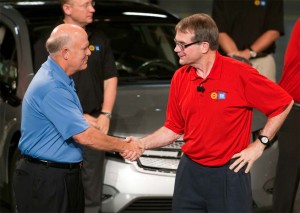
GM CEO Dan Akerson and UAW President Bob King shook hands at the opening of contract talks, in July.
Contract talks between the United Auto Workers Union and domestic carmakers are fast approaching the Sept, 14 deadline and UAW negotiators are pushing to wrap up the talks with General Motors and Chrysler first before taking on Ford – the only company the union is legally able to strike this year.
With all three Detroit makers reportedly unwilling to budge with new pay increases or added benefits, labor bargainers are struggling to find something they can take home to members – and are pushing for “signing bonuses” of as much as $10,000 a worker.
Company officials, meanwhile, are dangling the prospect of new U.S. jobs – while that carrot is offset by a stick that threatens to move even more UAW work out of the country.
There had been much speculation that the UAW would first target Ford, as it is considered the healthiest of the domestic makers – and because the possibility of a strike would appear to give the union more leverage that it might have at GM and Chrysler. Under terms of their 2009 federal bailouts, those two makers cannot be struck and, should negotiations deadlock, a final decision will be made by an outside arbitrator. But that isn’t how things seem to be working out.
Negotiations with Ford have lacked intensity for the past couple of weeks and Lewis Booth, Ford’s chief financial officer, told a conference for investors he expected to see Ford and the union to extend their talks past the deadline.
“We expect to continue to work and to continue the discussions,” Booth said.
Meanwhile, Harley Shaiken, a labor expert from the University of California-Berkley, said he expects the UAW to emerge with a settlement probably at GM on or just after the deadline. “I don’t think you gain anything by extending the talks,” Shaiken said.
However, the bargaining position of all three automakers appears to have hardened in the face of an economic slowdown and declining consumer confidence, which could put a strain on sales. In addition, a new report from Credit Suisse noted Ford has a serious deficit in its pension fund and both GM and Chrysler are also facing serious pension shortfalls.
The backdrop to the bargaining is putting tremendous pressure on union negotiators, who want to walk away from the table with tangible gains to show union members. The automakers are resisting the UAW’s top demand, which calls for boosting the pay of second tier workers. The union, according to Bloomberg, also has asked for signing bonuses of as much as $10,000.
The bonuses would costs the three automakers at total of $1.1 billon, However, UAW officials have called the signing-bonus report inaccurate.
But a large signing bonus may be essential to make a new contract palatable to union members particularly if their wages are frozen again and the two-tier pay system remains intact, Shaiken said. The union has to show there are real gains with whatever contract it comes up with, said the long-time student of the union, and “There’s nothing as real as a check up front.”
Workers at GM, Ford and Chrysler received signing bonuses of $3,000 after they ratified their current contracts in 2007.
Despite potential snags, there’s been nothing close to the level of vitriol often seen from the union in decades past. If anything UAW President Bob King has sounded a surprisingly conciliatory note, earlier this year telling a media gathering that his goal was to come up with “creative solutions” to the needs of both workers and management.
In a speech last month, King stressed that the union gains nothing if it raises the automaker’s fixed costs. “We are going to make sure the companies are competitive coming out of these agreements,” King said in the speech. “We are not going to disadvantage the companies we work with. Heck, we all want a wage increase, but is that the best way?”
King also has said the union won’t make any more concessions. “There is some conflict,” said Shaiken, who added that the union’s desire for economic gains is colliding with its push for the automakers to add jobs in the U.S. rather than Mexico or somewhere else.
Complicating matters, King also is concerned about the union’s image, which was shaped by a long tradition of militancy and strict construction of union work rules. King wants to stress that the UAW of the 21st Century knows the global economy requires cooperation between labor and management. The union has even asked advice from General Motors in using social media to turn its image, according to GM sources familiar with the initiative.
